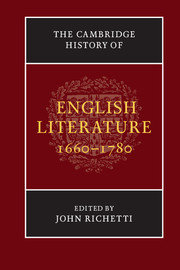Book contents
- Frontmatter
- Introduction
- PART I LITERARY PRODUCTION AND DISSEMINATION: CHANGING AUDIENCES AND EMERGING MEDIA
- PART II LITERARY GENRES: ADAPTATION AND REFORMATION
- PART III LITERATURE AND INTELLECTUAL LIFE: THE PRODUCTION AND TRANSMISSION OF CULTURE
- PART IV LITERATURE AND SOCIAL AND INSTITUTIONAL CHANGE
- 20 The eighteenth-century periodical essay
- 21 Public opinion and the political pamphlet
- 22 Sentimental fiction: ethics, social critique and philanthropy
- 23 Folklore, antiquarianism, scholarship and high literary culture
- PART V LITERARY GENRES: TRANSFORMATION AND NEW FORMS OF EXPRESSIVENESS
- PART VI CONCLUSION
- Chronology
- Bibliographies
- Index
- References
20 - The eighteenth-century periodical essay
from PART IV - LITERATURE AND SOCIAL AND INSTITUTIONAL CHANGE
Published online by Cambridge University Press: 28 March 2008
- Frontmatter
- Introduction
- PART I LITERARY PRODUCTION AND DISSEMINATION: CHANGING AUDIENCES AND EMERGING MEDIA
- PART II LITERARY GENRES: ADAPTATION AND REFORMATION
- PART III LITERATURE AND INTELLECTUAL LIFE: THE PRODUCTION AND TRANSMISSION OF CULTURE
- PART IV LITERATURE AND SOCIAL AND INSTITUTIONAL CHANGE
- 20 The eighteenth-century periodical essay
- 21 Public opinion and the political pamphlet
- 22 Sentimental fiction: ethics, social critique and philanthropy
- 23 Folklore, antiquarianism, scholarship and high literary culture
- PART V LITERARY GENRES: TRANSFORMATION AND NEW FORMS OF EXPRESSIVENESS
- PART VI CONCLUSION
- Chronology
- Bibliographies
- Index
- References
Summary
Despite deep roots in literary tradition and a far-reaching influence, the periodical essay is a genre that flourished only in a fifty-year period between 1709 and 1759. The rise of the genre begins with John Dunton's Athenian Gazette on 17 March 1691; its maturity arrives part way through Addison and Steele's Tatler (1709–11); and its decline is advanced when the last number of Goldsmith's short-lived Bee is published on 24 November 1759. In between the genre reaches its full flowering in Addison and Steele's daily Spectator (1711–12) and its most transcendent and durable form in Johnson's Rambler (1750–2).
More than most literary genres, the periodical essay belongs to a specific time period because of its tight connection to specific, datable changes in politics, in law and in publishing practices. The periodical essay is proper to a certain phase of periodical publication, which got its start in England during the Civil War but was not fully established until 1702, when the first true daily, the Daily Courant, began. In the early years, government control of the press had a powerful effect on periodical publication, which flourished most when there were disruptions in the government itself. A Census of British Newspapers and Periodicals 1620–1800 contains a chronological list of periodicals in print in Britain. A correlation of this list with political events and relevant legal changes would show that periodical publication always rises at times of national crisis and always falls when licensing laws are enforced. The numbers rise and fall a good deal before 1688, when they rise, never again to fall off very considerably.
- Type
- Chapter
- Information
- The Cambridge History of English Literature, 1660–1780 , pp. 525 - 548Publisher: Cambridge University PressPrint publication year: 2005
References
- 2
- Cited by



